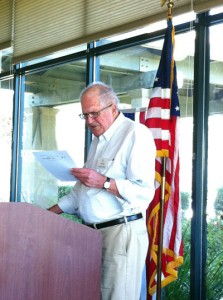Jack Mather on “Bell Ringers and Fire Eaters: Southern Rhetoric on the Road to War”
Jack presented colorful overviews of some of the Southern secessionist extremists in the late 1850s, including Edmund Ruffin, Louis Wigfall, William Yancey, and Preston Brooks. The following description was provided by Charlie Sweeny:
The time from the 1840s on became more and more intermittently inflamed over slavery. Power brokers of the North and the South warily and wearily watched each other and jealously pursued each slight, grievance or assault with noisy vigor. Typical of the era was Senator Charles Sumner of Massachusetts. He loudly reviled some Southern-tilting senators: Sen. Butler (S.C.)—Don Quixote, whose Dulcinea was “the harlot slavery”; and Sen. Stephen A. Douglas as Sancho Panza “the squire of slavery ready to do its humiliating offices.”
The Southern firebrands were ignited to retaliate. Three days later, a representative from South Carolina (and distant cousin of Sen. Butler) attacked Sumner as he sat defenseless in the Senate. He was badly beaten by the Southern cudgel to the point of great disability for the next three years, much to the acclaim of the Southern press and Northern damnation.
And so it went. A Southern (today we say, “activist”) sociopath named Wigfall (TX) entered the stage … assaulting or threatening Northern adherents. His c.v. included an 1840 duel with Preston Brooks, one fistfight, etc. Representative Keitt (S.C.) provided counsel on dueling; permissible yea or nay.
Each important event of the epoch, Missouri, compromise, the Dred Scott Decision, John Brown’s Raid, Kansas-Nebraska Act, all gave rise to further agitation and thoughts of secession. Lincoln’s election was the ultimate in fueling Southern fears.
Winston Groom wrote that the Southern press “painted a sensational picture of Lincoln in words and cartoons as an arch-abolitionist—a kind of antichrist who would turn the slaves loose to rape, murder and pillage.”

